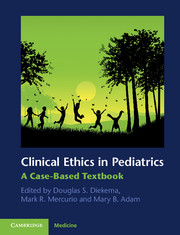Book contents
- Frontmatter
- Contents
- Contributors
- Preface
- Section 1 Core issues in clinical pediatric ethics
- Pediatric decision-making: informed consent, parental permission, and child assent
- 2 Pediatric decision-making: adolescent patients
- 3 Parental refusals of recommended medical interventions
- 4 Adolescent confidentiality
- 5 Refusals of treatment in adolescents and young adults
- 6 Family beliefs and the medical care of children
- 7 Fidelity and truthfulness in the pediatric setting: withholding information from children and adolescents
- 8 Fidelity and truthfulness: disclosure of errors
- 9 Requests for “non-therapeutic” interventions in children: male circumcision
- Section 2 Ethical issues at the beginning of life: perinatology and neonatology
- Section 3 When a child dies: ethical issues at the end of life
- Section 4 Ethical issues posed by advances in medical technology and science
- Section 5 Children, public health, and justice
- Section 6 Special topics in pediatric ethics
- Index
- References
7 - Fidelity and truthfulness in the pediatric setting: withholding information from children and adolescents
from Section 1 - Core issues in clinical pediatric ethics
Published online by Cambridge University Press: 07 October 2011
- Frontmatter
- Contents
- Contributors
- Preface
- Section 1 Core issues in clinical pediatric ethics
- Pediatric decision-making: informed consent, parental permission, and child assent
- 2 Pediatric decision-making: adolescent patients
- 3 Parental refusals of recommended medical interventions
- 4 Adolescent confidentiality
- 5 Refusals of treatment in adolescents and young adults
- 6 Family beliefs and the medical care of children
- 7 Fidelity and truthfulness in the pediatric setting: withholding information from children and adolescents
- 8 Fidelity and truthfulness: disclosure of errors
- 9 Requests for “non-therapeutic” interventions in children: male circumcision
- Section 2 Ethical issues at the beginning of life: perinatology and neonatology
- Section 3 When a child dies: ethical issues at the end of life
- Section 4 Ethical issues posed by advances in medical technology and science
- Section 5 Children, public health, and justice
- Section 6 Special topics in pediatric ethics
- Index
- References
Summary
Case narrative
Amanda is a bright, active 12-year-old, who has been experiencing some shortness of breath and taking naps after school, something she has never done even as a toddler. After fainting during a track and field meet, her physician ordered a number of tests and diagnosed Amanda with dilated cardiomyopathy. Amanda’s father died of a drug overdose before she was born. Amanda’s mother, Lynn, hoping to protect Amanda from knowledge of her father’s lifestyle, has told her that he died of a sudden heart attack. She is raising Amanda on her own, without family or community to support her.
At the time of Amanda’s diagnosis, her pediatric cardiologist advises Lynn that Amanda will likely need a heart transplant. He suggests that the pediatric cardiology fellow, advance practice nurse, and child life specialist meet with Amanda and her mother to explain Amanda’s condition, the medication she will have to take, and the likely need for surgery, in a developmentally appropriate way.
- Type
- Chapter
- Information
- Clinical Ethics in PediatricsA Case-Based Textbook, pp. 32 - 36Publisher: Cambridge University PressPrint publication year: 2011
References
- 2
- Cited by

